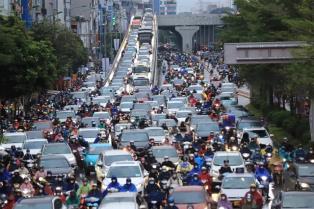Viet Nam imported 19,000 cars in the first quarter of this year, a year-on-year increase of 169 per cent in volume and 82 per cent in value, according to a report from the General Statistics Office (GSO).

Viet Nam imported 19,000 cars in the first quarter of this year, a year-on-year increase of 169 per cent in volume and 82 per cent in value, according to a report from the General Statistics Office (GSO).
The office said the number of imported cars notably increased in the first half of March. More than 4,800 units with nine seats or less were shipped to Viet Nam during this period at an average price of VND189 million each, excluding taxes such as import tax, special consumption tax and value-addedd tax. Of these, nearly 3,000 units were from India.
This trend has been witnessed since last year when the auto market was affected by the impact of the ASEAN Trade in Goods Agreement (ATIGA), according to which import tax on complete built-up units (CBU) was reduced from 40 per cent to 30 per cent, which will eventually become zero per cent by 2018.
Deputy director of the Export and Import Department of the Ministry of Industry and Trade Tran Thanh Hai said Viet Nam has committed to cutting and reducing import tax under the ATIGA and the ASEAN-China Free Trade Area (ACFTA), according to which import tax of CBUs from ASEAN to China and vice versa will be down to 50 per cent by 2020.
Within the ASEAN bloc, Hai said nations such as Thailand and Indonesia were performing well in the automobile industry and were a significant challenge for Vietnamese automakers.
The automobile market will possibly break out during the 2020-2025 period when domestic consumption accelerates. If local automakers fail to meet the demand, they will have to import cars and have no opportunity to join the global value chain. Moreover, it is time for foreign auto firms to shift their factories from Europe and America to Asia.
Viet Nam is also at risk of falling into the same situation as the Philippines where the market is underdeveloped with unclear policies, due to which automakers have withdrawn from the domestic market and have instead started importing vehicles, Hai told thoibaokinhdoanh.vn.
“The import of vehicles and parts will possibly increase in the coming years,” Hai said.
The selling price of cars in the Vietnamese market currently includes taxes such as import tax, special consumption tax, which is based on engine displacement, and value-added tax (VAT). In 2018, when import tax reduces to zero per cent within ASEAN, there will only be special consumption tax and VAT. If the government continues applying its current taxes and fees, the price is believed to go down in the future.
Pham Anh Tuan, head of the Vietnam Automobile Manufacturers’ Association (VAMA)’s Policy Subcommittee, told Viet Nam News that the prices of vehicles would be based on competition in the market and relevant tax policies.
“When the import tax becomes zero per cent, the price of imported vehicles from ASEAN countries will sharply decrease. Local automakers will be under pressure to cut prices if they want to continue competing in the market, in addition to facing several difficulties maintaining production and business after 2018,” Tuan said.
According to Tuan, average localisation rate of VAMA members is still low at some 40-50 per cent. This has resulted in a small volume of vehicles being produced and assembled in Viet Nam, which is only 10-20 per cent of other countries in the region. Besides this, the underdeveloped support industry has also resulted in local automakers failing to optimise their production process and localisation rate.
Within the current context, the increase in localisation rate is an important factor for local automakers to develop their production but still meet people’s demand for inexpensive cars.
It is a good sign for the industry that several local auto projects are executed this week. These include the second Mazda plant being jointly built by local giant automaker Truong Hai Automobile Company (Thaco) and Japanese car producer Mazda in central Quang Nam Province and a joint project on expanding production and assembling Hyundai passenger cars being implemented by Thanh Cong Group and its South Korean partner Hyundai Motor Group.
Both projects, which aim at meeting local increasing demand and exports, are expected to provide momentum to motivate other local automakers to increase localisation rate and supply quality products but at reasonable prices in the Vietnamese market. — VNS
- Tags
- imported cars
- Vietnam





